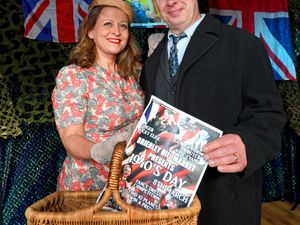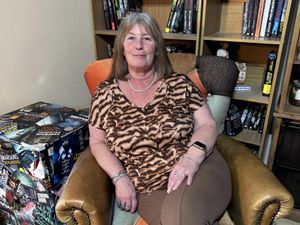WATCH: What it's like to be in Wolverhampton Pipe Band
Few instruments produce as distinct a sound as the bagpipes. It is among the world’s oldest musical instruments and learning to play takes time, practise and passion.
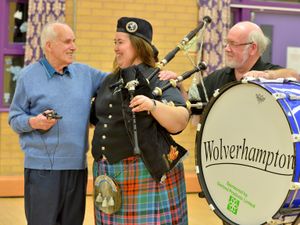
Among those helping to keep the much-loved tradition alive are members of the award-winning Wolverhampton Pipe Band.
The group, which leads the Kingswinford Remembrance Day Parade every year, was founded by Bert Anderson in the late 1960s and is now led by his son Roy.
Bert, now 88, started to learn how to play the bagpipes at the age of 20 when he lived in Northern Ireland and then passed on his knowledge to Roy when he was 11.
And it’s very much a family affair as Roy’s daughter, Vicki Kennerley, has also followed in their footsteps to become a piper.
WATCH the pipe band in action:
Roy, aged 64, who is the band’s pipe major, says playing the instrument is addictive. “They are unique and the sound they generate can evoke so many emotions.
“It’s something that gets in your blood and you can’t walk away from it,” he tells Weekend.
The bagpipe is a member of the woodwind family of instruments and works with a system of air and reeds. Each set has a bag, a chanter, a blowpipe, two tenor drones, and one bass drone.
The piper blows through the mouthpiece, sending air to the bag, which in turn keeps air flowing through the instrument’s four reeds simultaneously.
They will use their arm to apply pressure to the bag, making sure the sound flowing from the instrument remains steady and solid. The melody comes from the piper using their fingers to block holes on the chanter, creating the various notes.
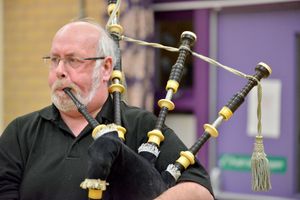
Learning to play is a big commitment and Roy says it helps to start at a young age as it’s easier than trying to pick it up later in life.
“A good age to start is 10 as children do pick it up faster. I have had people who are retired saying ‘I’ve always wanted to play the bagpipes’ but it will always be harder at that age,” he explains.
Sadly, Bert, who lives in Pensnett, is no longer able to play due to a lung condition but he is always on hand to offer his advice and share everything he knows with members of the group.
“I love it so much. I had been playing for 65 years before I had to stop. Since I started the band we’ve had a lot of success at competitions over the years,” he says.
Over the years the band, which meets on Tuesday evenings at Long Knowle Library in Wednesfield, has taken part in many prestigious competitions and their accolades included winning the Grade 4 English Champions’ title in 2016 and 2010.
“We are a competition band and we love competing. We are judged on musical performance. It’s all about the sound, how well we play together and sound unity,” says Roy, who lives in Kingswinford.
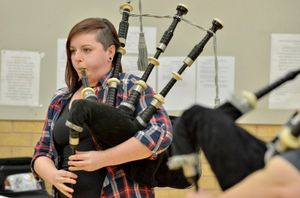
But they are desperately in need of drummers – a crucial part of the band – to enable them to compete in more events.
“We really need a bass drummer and side drummers to take part in competitions and complement our sound. They don’t need experience, they can be beginners, we will teach anybody who wants to learn. We’re really desperate to have drummers,” says Bert.
The group also takes part in public events having led the Remembrance Day Parade for Kingswinford British Legion for around 40 years and has previously been involved in St Patrick’s Day celebrations in Birmingham.
In November, Vicki, who lives in Cannock, played a central role in the Armistice Day tributes marking 100 years since the end of World War One.
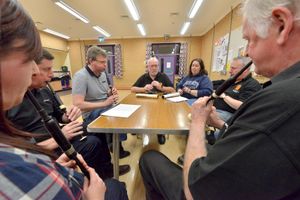
She was the lone piper playing The Battles O’er outside St Peter’s Collegiate Church in Wolverhampton at 6am on November 11 to mark the signing of the Armistice.
“I love playing. I’ve been playing for 30 years – my dad taught me at home. I love competing as a group and spending time with family,” says the 36-year-old.
Another piper, who started playing at a young age, is doctor’s receptionist Maria Birch, 27, from Claregate, Wolverhampton.
“I started when I was six as I was encouraged by extended family and I joined this group four years ago,” she says.
People are often surprised when they hear about her hobby, Maria tells us. “When I tell people I play the bagpipes, they are shocked and think I’m lying.I have to tell them I really do play.”
“I enjoy it because it’s just something completely different.
“It’s not easy, there are definitely easier instruments to learn to play but it’s good to be in this group,” she adds.
Origins
Although hearing bagpipes might evoke nostalgic images of Scotland, many historians think they actually originated in India at least 3,000 years ago.
They believe they then arrived in Britain with the Roman invasion of 43AD and written evidence shows they were in Scotland by the 15th century.
And it was the Highlanders who were the ones to develop the instrument to its fullest extent and make it, both in peace and war, their national instrument.
Today they are also an integral part of Burns Night celebrations on January 25, which honours the life and poetry of Scottish poet Robert Burns
A key part of events is the moment the steaming hot haggis is brought into the dining room accompanied by a piper playing one of Burns’s tunes.
Members of Wolverhampton Pipe Band will be kept busy next week as between them they have been booked to perform at 15 Burns Night events including one at The Springhill pub in Warstones Road, Wolverhampton.
“Time to channel our inner Rabbie Burns!,” says Vicki.
Anyone interested in joining the group can find out more at www.wolvespb.org.uk or www.facebook.com/WolverhamptonPB


